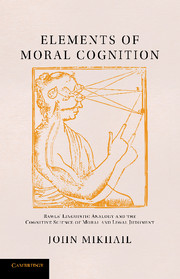 Elements of Moral Cognition
Elements of Moral Cognition Book contents
- Frontmatter
- Contents
- List of Tables and Figures
- Preface
- PART ONE THEORY
- 1 The Question Presented
- 2 A New Framework for the Theory of Moral Cognition
- 3 The Basic Elements of Rawls' Linguistic Analogy
- PART TWO EMPIRICAL ADEQUACY
- PART THREE OBJECTIONS AND REPLIES
- PART FOUR CONCLUSION
- Appendix: Six Trolley Problem Experiments
- Bibliography
- Index
3 - The Basic Elements of Rawls' Linguistic Analogy
Published online by Cambridge University Press: 07 September 2011
- Frontmatter
- Contents
- List of Tables and Figures
- Preface
- PART ONE THEORY
- 1 The Question Presented
- 2 A New Framework for the Theory of Moral Cognition
- 3 The Basic Elements of Rawls' Linguistic Analogy
- PART TWO EMPIRICAL ADEQUACY
- PART THREE OBJECTIONS AND REPLIES
- PART FOUR CONCLUSION
- Appendix: Six Trolley Problem Experiments
- Bibliography
- Index
Summary
It may now be ask'd in general, concerning this pain or pleasure, that distinguishes moral good and evil, From what principles is it derived, and whence does it arise in the human mind? To this I reply, first, that 'tis absurd to imagine, that in every particular instance, these sentiments are produc'd by an original quality and primary constitution. For as the number of our duties is, in a manner, infinite, 'tis impossible that our original instincts should extend to each of them, and from our very first infancy impress on the human mind all that multitude of precepts, which are contain'd in the compleatest system of ethics. Such a method of proceeding is not conformable to the usual maxims, by which nature is conducted, where a few principles produce all that variety we observe in the universe, and everything is carry'd on in the easiest and most simple manner. 'Tis necessary, therefore, to abridge these primary impulses, and find some more general principles, upon which all our notions of morals are founded.
– David Hume, A Treatise of Human NatureThe main argument of this book is that Rawls was correct to assume in Section 9 of A Theory of Justice that the theory of moral cognition is usefully modeled on aspects of Chomsky's theory of Universal Grammar.
- Type
- Chapter
- Information
- Elements of Moral CognitionRawls' Linguistic Analogy and the Cognitive Science of Moral and Legal Judgment, pp. 42 - 74Publisher: Cambridge University PressPrint publication year: 2011
- 1
- Cited by
